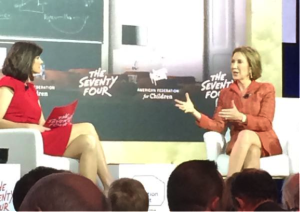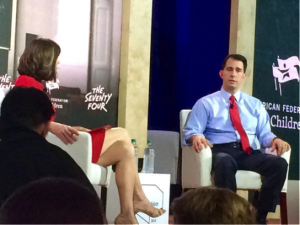The New Hampshire Education Summit, hosted by The Seventy Four and the American Federation for Children, provided a rare opportunity to hear about six presidential candidates’ views about education reform in a more in-depth and focused way, as education is sadly not usually the headline topic during election cycles. Below are some thoughts on their interviews:
Jeb Bush
Since Jeb Bush has spent much of his hiatus from elected office in the education reform world, it was unsurprising that he gave a true wonk’s performance during yesterday’s summit. The former Florida governor talked about his record in Florida, touting his reforms such as A-F school grading, merit pay for teachers, the voucher program (stuck down by the Florida Supreme Court), and the largest tax credit scholarship program in the nation, which CER ranked near the best in the country last year. He pointed to the innovative Florida Virtual School, and the potential shift towards content-mastery rather than seat time as a measurement for educational attainment. The governor also pointed to the results of his reforms, including an increase in NAEP scores and narrowing of achievement gaps between racial and socioeconomic categories.
Gov. Bush said he was “tired” of hearing people blame poor academic achievement on “the circumstances of life” rather than on a failed system.
Florida ranks #2 on CER’s Parent Power Index.
Carly Fiorina
Because her private sector background differs from those of the other candidates at the summit (all current or former governors with concrete education records to point to), Carly Fiorina took the opportunity to introduce summit attendees to her education reform principles. She focused on the purpose and necessity of an excellent education system for the United States, both as a republic and in global competition.
Fiorina pointed to the importance of character and other non-academic factors. Interestingly, many charter schools and turnaround operators point to their ability to build a high-achieving culture and how this often ties to academic success.
Fiorina spoke encouragingly about charter schools and other innovative options, dispelling the myth that more spending means higher achievement. She also stressed the importance of innovation, saying it is “the coin of the realm in the 21st century.”

John Kasich
Ohio Governor John Kasich also touted his school choice record. He pointed out the successes of the Cleveland voucher program, and stressed the need for accountability in the charter sector and among authorizers. However, the governor was not clear about what he meant by more accountability – did he mean transparency and accountability to parents for all schools? Or did he mean more bureaucratic accountability by re-regulating charter schools and making it more difficult for them to open and operate? We sure hope it’s not the latter!
Gov. Kasich also criticized “last in, first out” teacher layoff policies, saying that they deprive students of some of their best teachers.
Gov. Kasich urged the audience to “shake things up.” “We cannot worship at the altar of the status quo,” the governor proclaimed.
For more on Gov. Kasich’s views on education issues, visit Education 50.
Ohio ranks #8 on CER’s Parent Power Index.
Scott Walker
Wisconsin Governor Scott Walker is known for his tough stances against unions, including the teacher’s unions, and he continued on that theme during the summit, discussing the “barriers” put in place by unions that prevent kids from getting an excellent education. He also told the history of the groundbreaking Milwaukee voucher program – the longest-running private school choice program in the country – and how it has expanded under his tenure as governor. School choice, said Gov. Walker, is an “economic and moral imperative.”
For more on Gov. Walker’s views on education issues, visit Education 50.
Wisconsin ranks #9 on CER’s Parent Power Index.

Bobby Jindal
Louisiana Governor Bobby Jindal followed Governors Bush and Kasich in highlighting the school choice successes in his state. Gov. Jindal echoed CER’s sentiments that it shouldn’t take a hurricane or other horrific disasters to break open monopolies in the education system, pointing to New Orleans, now nearly all charter schools, and Louisiana’s voucher and tax credit programs as proof of his school choice bonafides. We were happy to hear Gov. Jindal clearly state where he thinks real accountability lies, when he announced “the best accountability system is parents!”
While Louisiana has indeed been a school choice leader, we would have liked to hear Gov. Jindal address the lack of options outside of New Orleans, as well as the low school participation rates in the state’s private school choice programs.
Gov. Jindal closed his interview by saying if he could snap his fingers and change a single thing in the education system, it would be to have dollars follow the child, because doing so would create pressure for excellence.
For more on Gov. Jindal’s views on education issues, visit Education 50.
Louisiana ranks #7 on CER’s Parent Power Index.
Chris Christie
New Jersey Governor Chris Christie championed reforms like a longer school year, and higher use of technology during his turn in Campbell Brown’s hot seat.
“Parents deserve more choice,” said Gov. Christie, “and kids’ priorities should be placed ahead of the comfort of adults.” Despite these strong words and reiterating his sentiment that the teacher’s unions deserve “a punch in the face,” Christie criticized Jeb Bush for saying he wouldn’t work with teachers’ unions, implying that the reality on the ground means that reformers must sometimes compromise with union leaders to get some reforms through.
Gov. Christie closed by pointing out that wealthy families already have school choice, and families of all incomes should be able to choose the best educational options for their children, not just families like Christie’s.
For more on Gov. Christie’s views on education issues, visit Education 50.
New Jersey ranks #32 on CER’s Parent Power Index.
Thank you to The Seventy Four and the American Federation for Children for putting together the summit, and to all six candidates for sharing their education visions.
As the 2016 election gets closer, CER will continue to keep you informed about where candidates stand on education issues, so that when it comes time to head to the polls, you know which candidates are the most likely to make policy decisions that empower parents by giving students choices.

